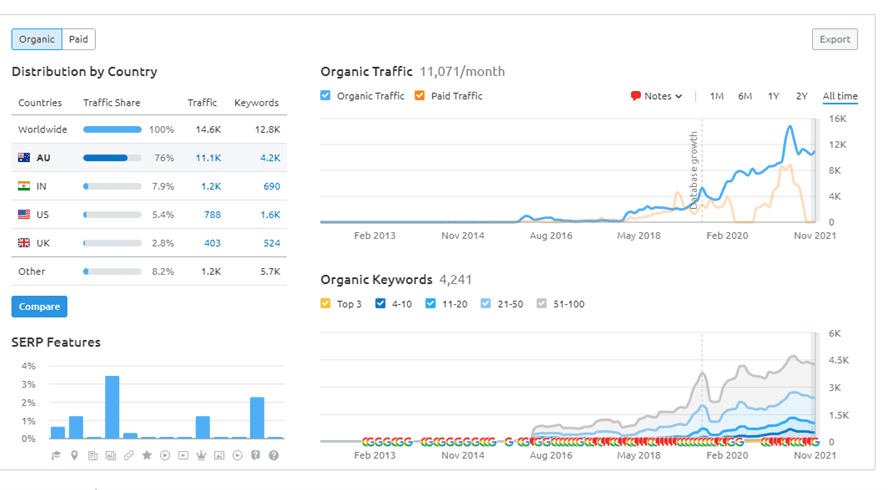Fintech SEO: Getting More Customers through SEO for Fintech
Search engine optimisation (SEO) can be an effective way to get more site visitors and sell your fintech products or services. If you are considering SEO for financial services of fintech, here are some ideas to consider when developing an SEO strategy and considering an SEO agency for financial services. We also provide a case study of how we helped one fintech business increase the non-brand organic visits by around five times by creating high-quality SEO content.
Start with content marketing strategies
There are many facets to getting high Google search results when pursuing fintech SEO. Ranking factors such as link building and web pages with fast loading speed are important but these come later in the game. Start by thinking about your target audience and what’s important to them. Next conduct keyword research to determine the search volumes for keywords. Before you create content, you will want to choose the keywords with the highest search volumes.
For example, if your fintech provides invoice finance, the keyword invoice finance has 720 searches per month on average. There are many other keywords to choose from but many have lower search volumes, such as invoice finance charges with 90 searches per month and fast invoice finance with only 10 searches per month on average. While it’s best to go after the keywords with the highest search volumes, you will also want to consider the keyword difficulty (how hard it is to rank on the first page in organic search results). In this case, all these three keywords have a similar keyword difficulty of around 40 out of 100.
If you have a choice between a very competitive word with high search volume and a moderately competitive word with medium search volume, you might want to focus on the easier one for a short-term win, and choose the other keyword for the long term, as it will take longer to rank for this keyword.
Create high-quality content for fintech SEO
The next step is to create content that supports SEO optimisation. The keywords you choose for each page will determine the length of the content and the related keywords (semantic) keywords to use. Using a program like the SEMrush SEO Writing Assistant will tell you how many words should be on the page and the related keywords to use for search engine optimization.
The content on each page will depend on the type of page. A landing page will be more sales focused, highlighting the features and benefits of your products or services. If the content will be on your blog, it will be more informational. The content marketing strategy with your blog content is to get people on your website and eventually look around at your product or service pages. Using our invoice finance example, your blog content could include information on related subjects, such as accounts receivable and cash flow. Of course, you will want to optimise the content for these terms to rank well in search results.
Using a program like SEMrush will show you what your competitors are ranking for. These will include commercial, transactional and informational keywords. Once you know what keywords other financial service companies are ranking for, you can choose some of these to compete with or find others that you want to rank for.
On-page SEO
Once you’ve created the content that’s optimised for the keywords used, you are set to publish it on your website. This will include creating a meta-title and meta description that’s also optimised for search engines. Yoast is a helpful WordPress plug-in that guides you through publishing SEO-friendly website content. It covers important parts of on-page SEO, such as including alt-tags in the images used on the page and having the right number of words for the page’s meta-title and meta-description. It will also warn you if you are using the keywords too many times.
Off-page SEO
Once you have written and uploaded suitable content for fintech SEO, the next step is off-page SEO. While there are several steps to off-page SEO, two of the most important are link building and social media. With link building, you will want to find websites with high domain rankings (also called domain authority) to link from. This can be a challenge because many of the typical sites for link building, such as directory sites, have low domain ratings.
Fintech SEO mistakes to avoid
From my experience with fintech SEO, here are several mistakes to avoid. If you’re looking for an SEO agency for financial services, keep these in mind.
Not being clear with current results and targets
A good SEO agency will be truthful about where you currently stand. One writing for a fintech company, I was part of the process of selecting an SEO agency. Having access to the current website results, I noticed that several of these had provided incorrect data to make it look like the fintech was not getting good SEO results. For example, they said that 75% of the visitors to the site were coming in through branded (company name) content when it was actually 25% who were finding the site through branded content.
Another SEO company put this fintech behind in search results compared to several competitors when it was substantially outperforming these competitors. Given these dishonest practices, it’s not surprising that many SEO experts have a bad reputation.
Not choosing the right keywords for fintech SEO
The keywords chosen should have high enough search volumes to justify optimising pages for them. If a keyword only has 10 searches per month on average, it’s probably not worth pursuing. Also, it’s okay to choose highly competitive keywords, but it should be made clear that it will take time and will be difficult to rank highly for these.
Not focusing on creating new, SEO-optimised content
For the best outcomes for fintech SEO, you’ll want to continuously add new content. Even if it’s one article per week, well-planned content will boost your site visits over time.
Using blackhat SEO techniques
Using dodgy backlinking can get you penalised by Google and will cost you in the long run. Be clear with any agency offering fintech SEO, that you will not tolerate this.
SEO for fintech case study
Here’s a graph from one fintech we created SEO content for. Over three years, between July 2018 and September 2021, we wrote more than 300 articles for their blog. The result was a fivefold increase in website visitors. This was combined with some backlinking but the main focus was creating SEO content. While there were ups and downs along the way, the overall trend with up over time, resulting in a fivefold increase in organic website visitors over three years.
Questions about fintech SEO
We’ll be glad to discuss your questions about SEO for fintech and how we can help with SEO content. Please call us on 1300 731 955 or send us an email.
Also, check out our article on SEO Cost and SEO Packages in Australia.




